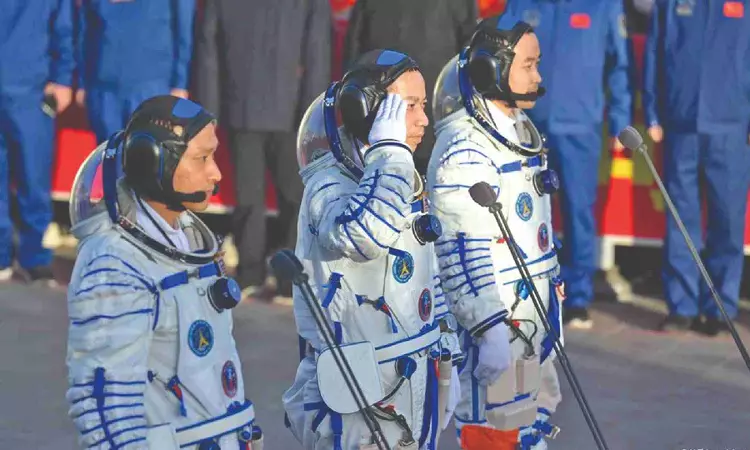China on the cosmos: Lonely in space despite lofty ambitions
After two successful predecessor trial projects, Tiangong-1 (2011-2017) and Tiangong-2 (2016-2019), China started building the new “Heavenly Palace” in 2021

Representative Image
DANG YUAN
In Chinese myths and legends, humans often climb up into the skies and venture into space. Beijing often makes use of these motifs to promote the idea of space as a non-ideological realm, free of Earthly politics. But ever since the mid-20th century Cold War “Space Race” between the United States and the Soviet Union, the politicization of space has been glaringly obvious. For competing nations, a lot is at stake: technological supremacy, plus the chance to flex economic and innovative clout.
Beijing once again proved its mettle as one of the world’s major space powers on Thursday when three taikonauts (Chinese astronauts) set off on the “Divine Ship” Shenzhou-17 for the Chinese space station, Tiangong. After ten minutes of flight time and six-and-a-half hours for docking maneuvers, they arrived safely in the “Heavenly Palace” (the English translation of Tiangong).
After two successful predecessor trial projects, Tiangong-1 (2011-2017) and Tiangong-2 (2016-2019), China started building the new “Heavenly Palace” in 2021. Construction was completed in November 2022. Three spacecraft, one supply craft and two space capsules, can dock on the station simultaneously.
The Chinese press has dubbed the space station the “three-room apartment” for its comparatively compact size. It is around 100 tons lighter than the International Space Station(ISS), which itself weighs in at around 450 tons. Tiangong is designed to operate for 15 years at an orbital altitude of around 450 km. At a recent conference in Azerbaijan, China announced it wanted to double the number of docked modules from three to six in the coming years.
Moreover, China is ready to take foreign space travelers along to Tiangong, the deputy director of the China Manned Space Agency, Lin Xiqiang, said. “We extend an invitation to the world and welcome all countries and regions committed to the peaceful use of outer space to cooperate with us and participate in the Chinese space station missions,” he said.
China’s space program is under the supervision of the military, the People’s Liberation Army. Selection and training of astronauts is closely bound up with the army. Of China’s 18 taikonauts so far, two of them women, only one civilian was able to fly into space, as a payload expert during the last mission.
But like all the space travelers who went before him, the university lecturer put his right hand on his helmet as a mark of respect for the military and the fatherland when he took off in the Shenzhou-16.
The list of China’s achievements to date and future plans is long: placing a lunar probe on the dark side of the moon in 2019, landing a Mars rover in 2021, installing a third space telescope by 2024 (to be docked to the space station for fuel tanking and supply), as well as its first manned moon mission by 2030.
In the race for space supremacy, the Chinese are hot on the heels of the US’ National Aeronautics and Space Agency (NASA). The only other space station apart from Tiangong in operation is the ISS, which has had a permanent crew in space since the year 2000.
China is barred from taking part in the international project due to opposition from the US. With the ISS only foreseen to operate until 2030, Tiangong should soon find itself to be humanity’s only outpost in orbit.
“China is already a major power in space and masters the whole spectrum of space disciplines,” Thomas Reiter, a former European Space Agency (ESA) astronaut from Germany, told DW.



